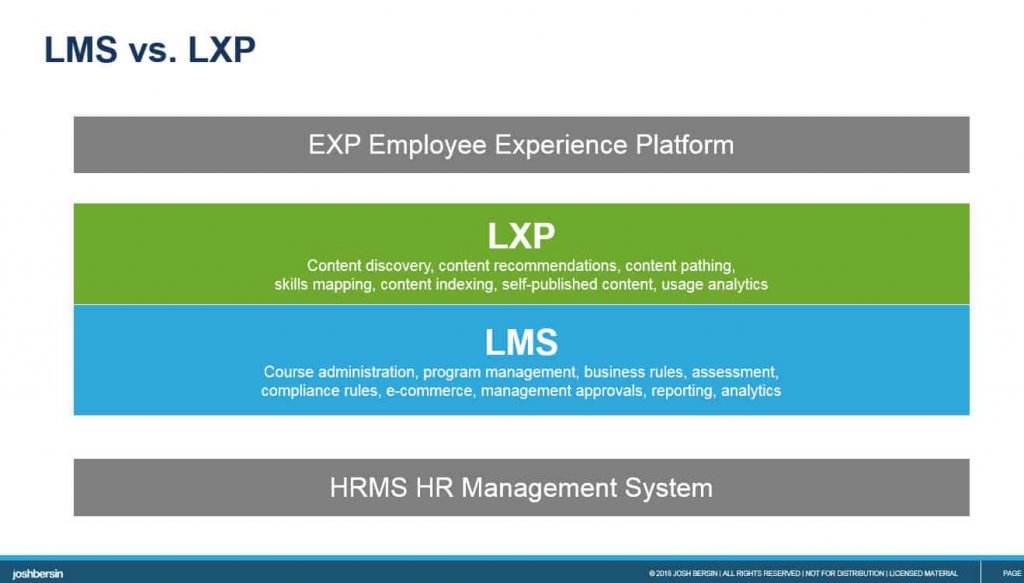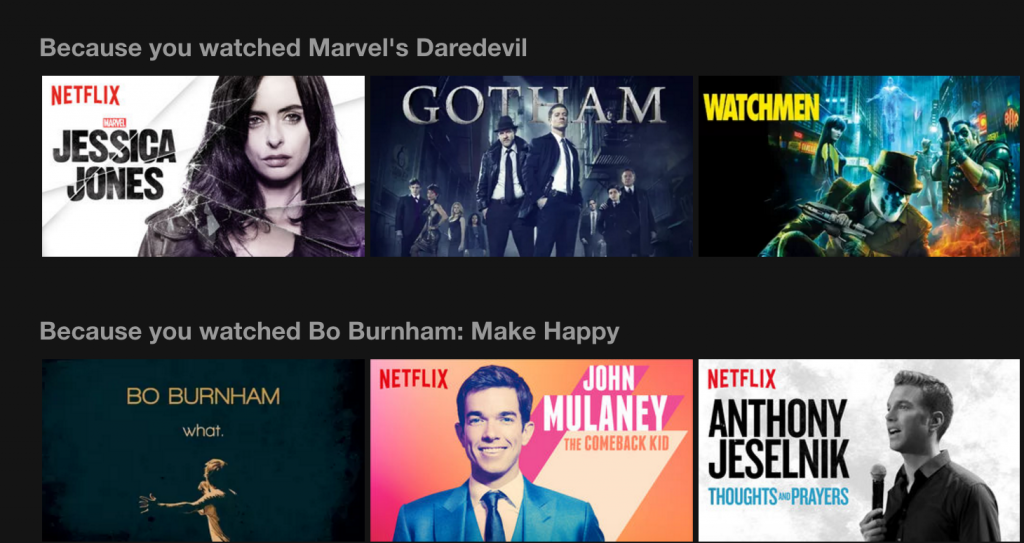Share
The traditional LMS market is changing
Josh Bersin recently said in an article that the LXP (Learning Experience Platform) or NGLE (Next Generation Learning Environments) market is growing so fast that it is too big to ignore.
$300 million and growing 50% per year (in other articles he spoke of a 200% growth), it may seem little compared to $4 billion of the LMS market, unless it is not two different markets but a product that is stealing share of the same market to another product. In this article I will analyse what (in my opinion) are the main differences but first we must consider…
Are we facing two markets?
To think that companies will pay for having an LMS and an LXP at the same time seems unrealistic to me. Surely it will be like this for some time because many companies have invested a lot of money in integrating their LMS with their existing ecosystem (ERPs, CRMs) and in adapting the LMS to their specific needs (graphic customizations, integrations with third parties and functional developments).

It is possible that there are companies interested in an LXP (and not in an LMS) and vice versa others will be interested in an LMS (and not in an LXP), after all they do different things. I think this separation will only last a while -the time that it takes for LXP vendors to develop the minimum level of functionality that they need to incorporate from the LMS world (import legacy content, add business rules etc.).During this period the LMS will be in charge of managing certain core processes such as compliance training and instructor-led events.
Bersin predicts that many of these business rules (onboarding, compliance) will not even be incorporated into LXPs but into HR systems. In the long term, the L&D departments will decide where they want to spend their budget and spend it on the system that provides the most benefits.

What is the game changer?
The core issue that has led to the emergence of this new breed of platforms is that by definitionLMS are designed to manage training, they are not user-centric. The most important issue to be solved by an LXP is to focus on user experience and facilitate the task of finding relevant knowledge.
Facilitate means “make available to the user” either through recommendation algorithms, search engines or learning routes.
Easy to find = Easy to consume
In this context, knowledge means many different things:
- Content that has been created within the platformContent that has been uploaded to the platform (which requires compatibility with SCORM / xAPI)
- Curation of content that exists outside the platform (which requires integrating MOOCs, articles, videos)
- People who are experts in a subject (which requires detecting experts and facilitating communication with these experts)
Knowledge can be relevant for many different reasons
- Because it is aligned with the interests of the user
- Because it covers the competencies that the user must have in the organization
- Because it is part of an organization process (onboarding)
- Because it responds to a specific need at a specific time (performance support)

What are the business rules?
All organizations have rules, which link training and development programs with people, considering the positions and functions within the current and future organization. Many of these initiatives start from the business areas, others from HR, and also from the day-to-day needs of the organization, or from the employee who wants to grow professionally. Involving the middle management is essential to activate people in terms of attainment of knowledge, especially when it is linked to the fulfillment of aspirational goals or goals.
These rules eventually result in the deployment of one or more of the following types of training programs and courses:
- Mandatory content: PRL, certifications or recertifications of an activity. They are usually evaluated.
- Onboarding: initial content of integration in the company or a new area of work.
- General programs linked to a position: content to acquire the necessary knowledge to comply with the current position. They are usually evaluated.
- Ad-hoc courses: that respond to new specific needs, necessary to fulfill your day-to-day activities (a new tool, changes in some process etc..). Some are evaluated.
- Programs linked to Performance: content that helps the user to meet the objectives and new challenges of day to day. Here a “new world” opens up when they are linked to learning “in the workflow” [LINK].
- Development Plans: programs that respond to work action plans identified by an evaluation (180-360) or feedback from the employees Manager.
- Coaching programs: individual or in small groups, to work on performance gaps or try to turn them into high performance teams.
- Leadership Programs: to work on negotiation skills, transversality, empower people, etc.
- Transformation programs: are those that link and help land the medium-term strategy with the evolution of people’s competencies, and may include new paradigms (digital) or methodologies (agile, SCRUM).
The greater the offer of previous programs and courses, the greater the administrative burden associated with the process, and therefore the investment. Although some program listed above can be administered and deployed through the LMS, the linked manual processes require a high degree of administration. In addition activity that takes place outside of the LMStraditional classroom training, external training, online training in other platforms such as MOOCs, …) has been traditionally difficult to integrate results, both to leave “trace” and student history, and to make decisions regarding changes in positions, promotions or successions.

However, even considering if all the above is not essential (it is difficult to find two organizations that have everything integrated), as Bersin explains, the main problem is that “discovering which programs are the most suitable for which people” is very complex. And that is why many think that the basic mission of the LXP should be to “index” the world of learning, and become within the organization in “the Google of e-learning“.
How to detect content that is relevant to the user?
Bersin talks about 6 approaches:
1.- Learning based on competences or skills.
It is about having competences associated with positions and therefore being able to detect the competences and skills that a user possesses. The next step is mapping these skills with the content and offering recommendations based on the gap between the skills that the user should have by his position versus what he/she really has.
2.- Recommendations based on usage data.
Based on the use of other similar users, we can recommend relevant content to a user.
3.- Content analysis.
Based on AI. It requires content analysis. It’s about understanding what the content is about. What will the user who consumes this content learn?
4.- Asking the user.
Allowing the user to define their interests but also their aspirations, levels of experience, learning preferences, etc. A recommendation engine offers the user external but also internal content (such as magpie byFiltered).
5.- Based on business rules.
Incorporating the old business rules into the LXP. For example: An electrical installer of my organization must approve this certification annually, an action plan after a performance evaluation, etc.
5.- Analysis of data
Based on consumption and tracking data.
And to finish… where to start?
If these new platforms contribute something, it’s simplicity. An LXP and an LMS can coexist in the same organization and measure the results: What is the average session time in each of them? Do employees visit one more than the other? Are you more satisfied with one than with the other?
Original source: Jose Manuel Martin.
Share

